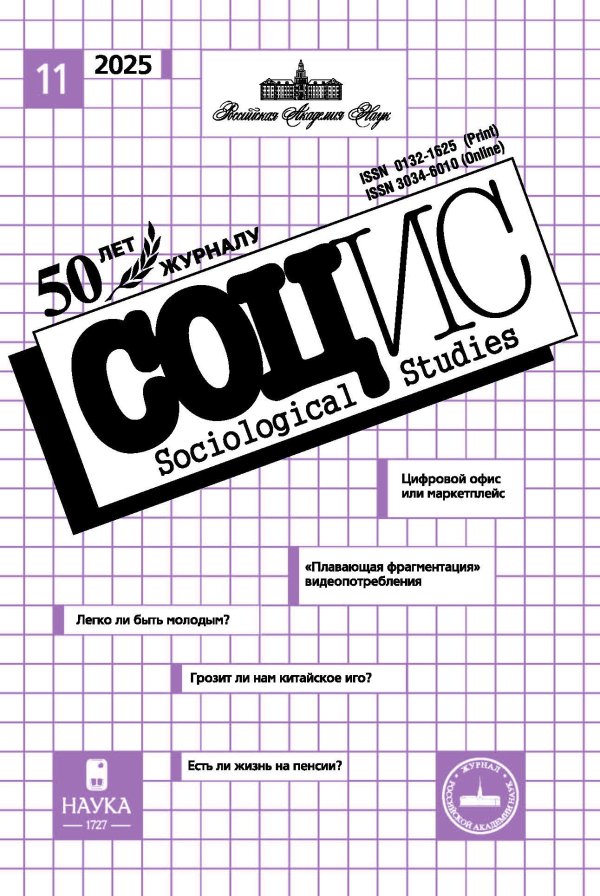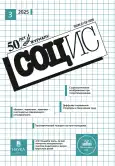Civic virtues ideas among young social activists in St. Petersburg
- Authors: Balatsyuk E.S.1, Bemler E.S.1
-
Affiliations:
- National Research University Higher School of Economics
- Issue: No 3 (2025)
- Pages: 65-74
- Section: SOCIOLOGY OF YOUTH
- URL: https://journal-vniispk.ru/0132-1625/article/view/292875
- DOI: https://doi.org/10.31857/S0132162525030064
- ID: 292875
Abstract
The article presents an analysis of ideas about citizenship among young social activists of St. Petersburg. The authors analyse this issue using the case of young leaders of socially oriented initiatives of St. Petersburg. The empirical base of the study was 19 in-depth interviews with the creators of social projects. The key meaning of civic participation by young activists is the production of public goods, which they articulate in the categories of “inclusion”, “safe social environment”, “creation of community”, “educational activities”. Young people try to set their own vector of understanding social problems and ways to solve them. The narratives of informants show that young people perceive their participation in the field of citizenship not only as a personal gain, but also as an opportunity to promote egalitarian and humanistic values. This is reflected in three key meanings of citizenship – “Creating opportunities for self-development”, “Creating a field for self-realization”, “Creating a significant contribution to social development”. Young people are actively developing their own projects, while paying attention to issues that usually escape the dominant social discourse.
Keywords
Full Text
About the authors
Elizaveta S. Balatsyuk
National Research University Higher School of Economics
Author for correspondence.
Email: ebalatsyuk@hse.ru
Junior Researcher, Center for Youth Studies
Russian Federation, St. PetersburgEkaterina S. Bemler
National Research University Higher School of Economics
Email: ebemler@hse.ru
Research Intern, Center for Youth Studies
Russian Federation, St. PetersburgReferences
- Antonova N. L., Abramova S. B., Polyakova V. V. (2020) The right to the city: daily practices of youth and participation in the production of urban space. Monitoring obshchestvennogo mneniya: ekonomicheskie i social’nye peremeny. [Monitoring of Public Opinion: Economic and Social Changes]. No. 3: 443–462. (In Russ.)
- Bauman Z., Donskis L. (2019) Liquid Evil: Life in a World Where There are no Alternatives. St. Petersburg: Ivan Limbach Publishing House. (In Russ.)
- Beck U. (2000) Risk Society: Towards a New Modernity. Moscow: Progress-Tradiciya. (In Russ.)
- Black R., Walsh L. (2011) Negotiating Vulnerabilities in Space and Time in the Twenty-First Century. Journal of Applied Youth Studies. No. 4(4): 329–343.
- Bowman N. A. (2011) Promoting participation in a Diverse Democracy: A Meta-Analysis of College Diversity Experiences and Civic Engagement. Review of Educational Research. No. 81(1): 29–68.
- Christiaens T. (2020) The entrepreneur of the Self Beyond Foucault’s Neoliberal Homo Economicus. European Journal of Social Theory. No. 23(4): 493–511.
- du Gay P. (1996) Organizing identity: Entrepreneurial governance and Public Management. In: Hall S., du Gay P. (eds) Questions of Cultural Identity. London: Sage: 151–169.
- Fröhlich C. (2020) Urban Citizenship under Post-Soviet Conditions: Grassroots Struggles of Residents in Contemporary Moscow. Journal of Urban Affairs. No. 42(2): 188–202.
- Ho E., Clarke A., Dougherty I. (2015) Youth-led social change: Topics, Engagement Types, Organizational Types, Strategies, and impacts. Futures. No. 67: 52–62.
- Gifford C., Mycock A., Murakami J. (2014) Becoming citizens in Late Modernity: A Global-National Comparison of Young People in Japan and the UK. Citizenship studies. No. 18(1): 81–98.
- Kapustin B. G. (2010) What is “civil society”? Critique of political philosophy. Moscow: Territoriya budushchego. (In Russ.)
- Kochetkov A. P. (2012) Some trends in the development of modern Civil Society. Vestnik Moskovskogo universiteta. Seriya 12. Politologiya [Moscow University Bulletin. Series 12. Political Science]. No. 2: 53–69. (In Russ.)
- Kravtsova A. N. (2019) Transformation of “Citizenship” Among Pro- and post-NASHI activists. Monitoring obshchestvennogo mneniya: ekonomicheskie i social’nye peremeny [Monitoring of Public Opinion: Economic and Social Changes]. No. 1: 107–125. (In Russ.)
- Krupets Ya., Morris J., Nartova N., Omelchenko E., Sabirova G. (2017) Imagining Young Adults’ Citizenship in Russia: From Fatalism to Affective Ideas of Belonging. Journal of Youth Studies. No. 20(2): 252–267.
- Marshall T. H. (1950) Citizenship and Social Class and Other Essays. Cambridge: The Syndics of the Cambridge University Press.
- Nartova N. (2021) Citizenship and Social Engagement of Youth in the Putin Era. In: Omelchenko E. (ed) Youth in Putin’s Russia. Basingstoke: Palgrave Macmillan: 137–165.
- Nikovskaya L. I. (2011) Civil initiatives and modernization of Russia. Moscow: Klyuch-S. (In Russ.)
- Nikovskaya L. I., Skalaban I. A. (2017) Civic Participation: Features of Discourse and Actual Trends of Development. Polis. Politicheskie issledovaniya [Polis. Political Studies]. No. 6: 43–60. (In Russ.)
- Petukhov V. V. (2020) Russian Youth and Its Role in Society Transformation. Monitoring obshchestvennogo mneniya: ekonomicheskie i social’nye peremeny [Monitoring of Public Opinion: Economic and Social Changes]. No. 3(157): 119–138. (In Russ.)
- Rudenkin D. V. (2019) The Values Factor in the development of Protest Moods Among Young People: results of a Pilot Study. Mir nauki. Sociologiya, filologiya, kul’turologiya [World of Science. Series: Sociology, Philology, Cultural Studies]. Т. 10. No. 1: 1–8. (In Russ.)
- Rudenkin D. V. (2020) Polarities of Russian Youth’s Political Activity: A Comparison of activists of pro-government and Opposition Movements. Vestnik Tomskogo gosudarstvennogo universiteta. Filosofiya. Sociologiya. Politologiya [Tomsk State University Journal of Philosophy, Sociology and Political Science]. No. 55: 203–215. (In Russ.)
- Shabunova A.A, Ukhanova Y. V., Kosygina K. E. (2023) Youth Civic Participation in the region: opportunities and limitations. Zhurnal sociologii i social’noj antropologii [The Journal of Sociology and Social Anthropology]. No. 26 (1): 167–199. (In Russ.)
- Skokova Y. A., Rybnikova M. A. (2022) The size of Nonprofit Sector in Russian Regions: Differentiating Factors. Zhurnal sociologii i social’noj antropologii [The Journal of Sociology and Social Anthropology]. No. 25: 70–102. (In Russ.)
- Smirnov V. A. (2020) Effectiveness of Grant Support for Russian Socially-Oriented Non-Profit Organizations (the Case of the Presidential Grants Foundation). Sotsiologicheskie issledovaniya [Sociological Studies]. No. 9: 79–89. (In Russ.)
- Threadgold S. (2017) Youth, class and everyday struggles. London: Routledge.
- Vasilyeva E. I., Zerchaninova T. E., Nikitina A. S. (2021) Civic activity and Youth Participation in Socio-Political Processes. Voprosy upravleniya [Public Administration Issues]. No. 6(73). P. 67–80. (In Russ.)
- Wood B. E. (2022) Youth citizenship: Expanding conceptions of the young citizen. Geography Compass. 2022. No. 16(12):1–13.
- Yanay-Ventura G., Yakhnich L., Michael K., Sharabi M. (2023) From Managing Volunteers to Managing Partnerships: Excluded Youth as Active Partners in Non-Profit Organisations. Voluntary Sector Review: 1–23.
- Zubok Yu.A., Berezutsky Yu.V. (2020) Social activity of youth: ideological foundations of self-regulation. Vlast’ i upravlenie na Vostoke Rossii [Power and administration in the East of Russia]. No. 2(91): 89– 105. (In Russ.)










